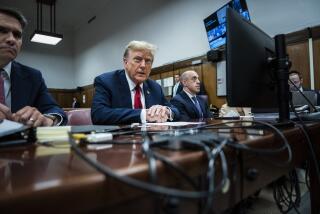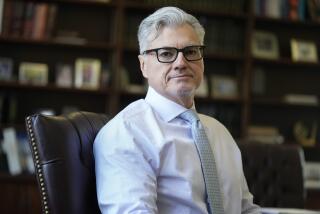Dennis Hastert to be arraigned on hush-money charges
Former U.S. House Speaker J. Dennis Hastert will trigger a media frenzy when he arrives at the federal courthouse in downtown Chicago on Tuesday to answer to charges of hush money payments and lying to federal agents, but his long-awaited first court appearance may leave more questions than answers.
After nearly two weeks in hiding since the bombshell indictment grabbed the national spotlight, the 73-year-old Illinois Republican is scheduled to appear before U.S. District Court Judge Thomas Durkin for an arraignment, a procedural hearing that’s usually over in minutes and is rarely illuminating.
Still, the appearance of a man once second in line to the U.S. presidency on criminal charges will be anything but routine. Court officials Monday announced special measures for his arraignment, which is likely to spark a circus unseen at the Dirksen U.S. Courthouse since then-Gov. Rod Blagojevich’s arrest on corruption charges 6-1/2 years ago.
The hearing comes amid a deepening mystery surrounding Hastert’s alleged wrongdoing during his days as a high school teacher and wrestling coach decades ago in Yorkville, Ill. The carefully worded, seven-page indictment unsealed May 28 only hinted at Hastert’s past in alleging he had agreed to willingly pay $3.5 million to a person identified as Individual A to hide previous wrongdoing, but federal law enforcement sources have said Hastert was making the payments to conceal sexual abuse of a Yorkville High School student.
Since the charges were filed, other details have bubbled to the surface. Law enforcement sources said the FBI had interviewed a second person who raised similar allegations of sexual abuse against Hastert that corroborated the account of Individual A. Last week, a onetime Yorkville resident took to national television to say Hastert abused her now-deceased brother while he was a student.
Amid the disclosures, Hastert has remained silent, staying out of public view while reporters scoured his home base in Chicago’s far western suburbs for clues. Numerous former wrestlers under Hastert who have been contacted by the Chicago Tribune have either declined comment or said they do not know the identity of the person described as Individual A.
Adding to the intrigue, no lawyer stepped forward to defend Hastert in the media as typically happens in high-profile criminal cases. It wasn’t until Monday afternoon that the identity of Hastert’s attorney was even made public when Thomas C. Green, a longtime white-collar defense attorney with the law firm of Sidley Austin in Washington, filed his appearance with the court.
Green did not respond to calls or emails Monday seeking comment.
Despite the reports of sexual abuse that have come out since Hastert’s indictment, the main count against him is a dry and technical violation involving the illegal structuring of bank withdrawals to hide the more than $1.7 million in payments he allegedly made to Individual A.
According to the indictment, from June 2010 to April 2012, Hastert made 15 withdrawals of $50,000 each from bank accounts he controlled and paid Individual A that cash about every six weeks. After bank representatives questioned Hastert about the withdrawals in 2012, he began illegally structuring the cash withdrawals in increments of less than $10,000 to keep his hush payments secret and cover up his past misconduct, the indictment said.
From July 2012 to December 2014, Hastert made in excess of 100 withdrawals, all less than $10,000 each, to evade bank reporting requirements, the indictment charged. Those withdrawals totaled about $952,000 in cash, prosecutors alleged.
When questioned by FBI agents in December about the withdrawals, Hastert allegedly lied by saying he was trying to store cash because he didn’t feel safe with the banking system, according to the charges.
Even though the statute of limitations to charge Hastert with sexual abuse ran out long ago if it occurred decades ago, federal prosecutors would likely have to bring out details of the alleged molestation of underage Individual A at trial to prove the charge that Hastert lied to the FBI about the bank withdrawals.
And if Hastert were convicted, prosecutors might be allowed to use information about other victims to secure more prison time at a sentencing hearing because of its lower burden of proof.
The vague wording of the indictment also left unclear whether Individual A could face charges of extortion. The charges state Hastert had agreed to make the payments, but even if authorities suspected he did so only after being threatened with exposure, proving a charge such as extortion would likely require a victim willing to cooperate in the investigation.
At his arraignment Tuesday, Hastert, like hundreds of other defendants each year at Chicago’s federal courthouse, will likely waive a formal reading of the indictment and enter a plea to the charges — probably through his attorney. His plea starts the legal clock ticking toward trial.
Hastert will also be processed Tuesday by the U.S. marshals office on the 24th floor of the courthouse, a procedure that can sometimes take up to two hours. Hastert will be fingerprinted, photographed and interviewed by pretrial services before being released on his own recognizance. Unlike in state court, his mug shot will not be made public.
As national cable news satellite trucks began arriving outside Federal Plaza on Monday, court officials announced that out-of-town reporters and spectators who want a seat in Durkin’s 14th-floor courtroom should begin lining up in the hallway as early as 11:30 a.m., or 2-1/2 hours before the hearing at 2 p.m. CDT.
Twitter @jmetr22b
More to Read
Start your day right
Sign up for Essential California for news, features and recommendations from the L.A. Times and beyond in your inbox six days a week.
You may occasionally receive promotional content from the Los Angeles Times.






